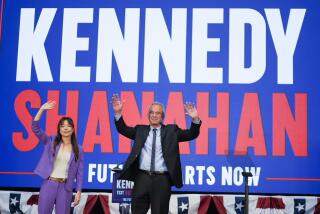RONALD BROWNSTEIN / WASHINGTON OUTLOOK : Mantle of ‘Outsider’ an Imperfect Fit for 3 GOP Contenders Who Wear It
- Share via
WILMINGTON, Del. — It’s no coincidence that Lamar Alexander, Patrick J. Buchanan and Malcolm S. (Steve) Forbes Jr. were the first three candidates who fell into line last week when the group U.S. Term Limits asked the GOP presidential contenders to pledge their commitment to a constitutional amendment limiting congressional terms.
Support for term limits has become the symbol of choice for politicians trying to convince voters that they are seeking office only to humble other politicians. And in their uphill bids for the GOP presidential nomination, all three men now are largely staking their hopes on convincing Republican voters that they are the most determined to dethrone what Forbes disdainfully calls “the political class.”
By presenting themselves as Ross Perot-flavored non-politicians, Alexander, Buchanan and Forbes are hoping to distinguish themselves from the most prominent Washington insiders in the race--Sens. Bob Dole of Kansas and Phil Gramm of Texas, who have earned their living in Congress since 1961 and 1979 respectively. But these three putative outsiders are having more trouble separating themselves from one another.
When the Republican candidates met for their first nationally televised joint appearance the other day in New Hampshire, Alexander, Forbes and Buchanan seemed to be reading off each other’s cue cards with their interchangeable attacks on “the culture of Washington.”
One early October poll in New Hampshire found the three men running second, third and fourth behind Dole--but all bunched together between 7% and 9% of the vote, far behind the front-runner’s 35%. (A more recent survey found Forbes trailing the other two.) “There’s a little bit of clutter there,” acknowledged Tom Rath, a Concord, N.H., attorney working with Alexander.
*
Each of these candidates is an imperfect fit as a Washington outsider, as the other two are happy to point out. Alexander worked in the Richard Nixon White House, and after two terms as Tennessee’s governor, served George Bush as secretary of education. Buchanan acerbically notes that when he was challenging Bush in the 1992 Republican primaries, “Alexander was working on expanding the Education Department and sitting down and having lunch in the Cabinet Room in George Bush’s White House. I don’t think he was an outsider or a challenger to the Establishment; he was part of it.”
But Buchanan, who grew up in Washington, has been a prominent figure in the capital for almost 30 years--as a White House aide to Nixon and Ronald Reagan, and a well-compensated columnist and television commentator. “Buchanan has been part and parcel of Washington since the 1960s,” sniffed Forbes, “so his record speaks for itself.”
Forbes, the latest entrant into the Republican race, has never sought public office or held a full-time job in Washington; but as heir to his family’s magazine publishing empire, he has a net worth that has been frequently estimated at around $400 million, not the usual pedigree for a populist. When he hears those numbers, Buchanan’s eyes open as wide as Ken Griffey Jr. around a hanging curveball. “If you can’t make an issue out of a guy with a 151-foot yacht,” Buchanan said, “you ought to hang it up.”
*
Maybe so. But Perot showed in 1992 that populists now come in all shapes and income classes. And Alexander, Buchanan and Forbes have each constructed contrasting anti-Establishment messages carefully targeted toward the same currents of discontent that propelled Perot’s remarkable showing three years ago.
Of the three, Buchanan brings the sharpest edge. In 1992, he challenged Bush as the knight of the right--the voice of conservatives who felt Bush had betrayed Reagan’s legacy. This time he’s running as the tribune of the common man--a kind of ideologically inverted Henry Wallace.
Buchanan has broadened his appeal from 1992 to hit all of the notes that move economically squeezed downscale white voters--cultural conservatism, political reform, economic nationalism. Earlier this month, Buchanan stood in Exeter, N.H., before a factory closed since all its jobs were moved to Mexico and denounced big business for abandoning American workers with all the gusto of a Ralph Nader. “There’s a trade-off,” he thundered, “a tremendous price being paid by the working people of America for all these profits corporations are piling up.”
Forbes has a lighter touch and a different set of targets. During a day of appearances last week before business groups in Wilmington, he was soft-spoken, unfailingly polite and ingratiatingly awkward, with a goofy, crooked grin. People love or hate Buchanan; Forbes’ audiences seem to want to protect him.
Forbes lacks most of the usual assets of a serious presidential contender: political experience, a national reputation, or even the forceful personal presence of a Perot. But he shares with Perot the ability to reach deep into his pockets to broadcast his message; right now, radio and television ads from Forbes are falling in New Hampshire faster than the leaves.
Forbes may be an unusual messenger, but he is delivering a crisp, effective message. He offers himself as something close to the second coming of his friend Jack Kemp, the founding supply-side congressman who sought the 1988 GOP nomination. Like Kemp, Forbes preaches tax cuts, the gold standard, racial inclusion and optimism. On the stump and in his advertisements, Forbes emphasizes two issues: support for term limits and a replacement of the progressive income tax with a 17% flat tax that would eliminate even the deductions for mortgage interest and charitable donations. Eliminating Washington’s ability to dispense favors through the tax code, Forbes insists, “would remove the principal source of political pollution and corruption.”
Listening to Buchanan and Forbes, Alexander sometimes seems tempted to sue for copyright infringement; he was the first candidate to break for the outside rail. Subtlety isn’t his strong point: Alexander has been walking across New Hampshire in a red flannel shirt meant to symbolize his distance from his button-down competitors.
His agenda, however, has meat: He proposes to radically devolve control over social policy away from Washington--not only to the states, but neighborhoods, charities and individuals. “More than anything else,” he said, “the key to our future is to expect Washington to do less and to expect more from ourselves.” With Forbes and Buchanan crowding his space, Alexander has lately taken to calling himself the outsider who understands Washington well enough “not to get skinned if I go back.”
Such a Jesuitic distinction suggests how much each of these candidates is tangling in the others’ nets. All three now focus most of their fire on Dole, but in the effort to break free they are beginning to slash at each other.
*
Forbes, an ardent free-trader, denounces Buchanan’s calls for a “social tariff” on Third World imports as a hidden tax. “I want to tear down walls,” Forbes said, “he wants to build walls.”
Alexander, who supports a less-purist version of the flat tax, already has suggested that Forbes’ proposed elimination of the home mortgage deduction would trigger a real estate collapse, and Alexander’s aides point out that the Forbes plan, by eliminating personal taxation on capital gains and interest income, could leave a multimillionaire investor like Forbes himself paying less federal tax than an economically squeezed middle-class family.
Buchanan and Forbes both face doubts that they can enlarge their support enough to become viable contenders. Most observers believe that Alexander has more potential to grow, but he lacks the secure base that Buchanan’s ideological following and Forbes’ money provide them.
What they all share is a common vulnerability to the shadow lengthening over the field. If non-politician Colin L. Powell enters the race, all three of these aspiring outsiders could find themselves suddenly outside--in the cold.
The Washington Outlook column appears here every other Monday.
More to Read
Get the L.A. Times Politics newsletter
Deeply reported insights into legislation, politics and policy from Sacramento, Washington and beyond. In your inbox twice per week.
You may occasionally receive promotional content from the Los Angeles Times.










